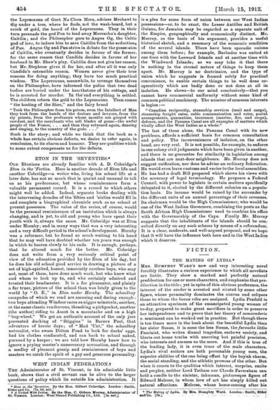WEST INDIAN FEDERATIONt THE Administrator of St. Vincent, in his
admirable little hook, shows that a civil servant can be alive to the larger questions of policy which lie outside his administration. It
• Eton in th.'Secenties. By the Hon. Gilbert Coleridge. London : Smith, Elder and Co. [7a. 6d. net.] . t A United -Vest Indies. -My the.mon. C. Gideon Murray, Administrator-of ilacreo.*.The Mee:3g of Lydia..., By Mrs. Hnmphty Waist. -London : SW. th; St. Vineent. London; West Strand Publishing Co., Ltd. [1s. net.] is a plea for some form of union between our West Indian possessions—or, to -be exact, the Lesser Antilles and British Guiana, for Jamaica may be regarded as a separate unit of the Empire, geographically and economically distinct.. Mr. Murray, as the basis of . his argument, provides a useful historical sketch, and a summary of the economic condition of the several islands. There -have been sporadic unions among them before ; for example, Barbados was united at one time with the Leeward Islands and at another time with the Windward Islands; so we may take it that there is nothing in the eternal nature of things to keep them apart. Mr. Murray is no doctrinaire, and the type of union which he suggests is framed solely for practical convenience, to enable certain things to be well done co- operatively which are badly done or not done at all in isolation. He shows—to our mind conclusively—that you cannot have commercial uniformity without some 'kind of common political machinery. The number of common interests is legion :— " Canadian reciprocity, steamship services (mail and cargo), steamship freight rates, cable communication and rates, postal arrangements, quarantine, insurance (marine, fire, and crops), defence, and the Panama Canal are all examples of matters which vitally affect.the West Indies as a whole."
The last of these alone, the Panama Canal with its new problems, affords a sufficient basis -for common consultation
and policy. The inconveniences of isolation, on the other hand, are very real. It is not possible, for example, to enforce in one colony civil judgments which have been given in anothei-, and there is no guarantee for similarity in legislation among islands that are next-door neighbours. Mr. Murray does not suggest unification, nor does he advise an ordinary federation. He would even leave customs and excise to the local assemblies. He has had a draft Bill prepared which shows his views with the accuracy of legal terminology. He proposes a Federal Council, with power to legislate in certain matters specifically
delegated to it, elected by the different colonies on a popula- tion basis. Its income would be raised by the surrender by the different units of an annual percentage of their revenues. Its chairman would be the High Commissioner, who would-be one of the West Indian Governors, combining the posts as the South African High Cominissioner used to. combine b_ is office with the Governorship of the Cape. Finally Mr. Murray suggests that the inhabitants of the islands should be con- sulted directly on any such scheme by means of a referendunii It is a clear, moderate, and well-argued proPOsal, and we hope that it will have the influence both here and in the West Indies which it deserves.














































 Previous page
Previous page